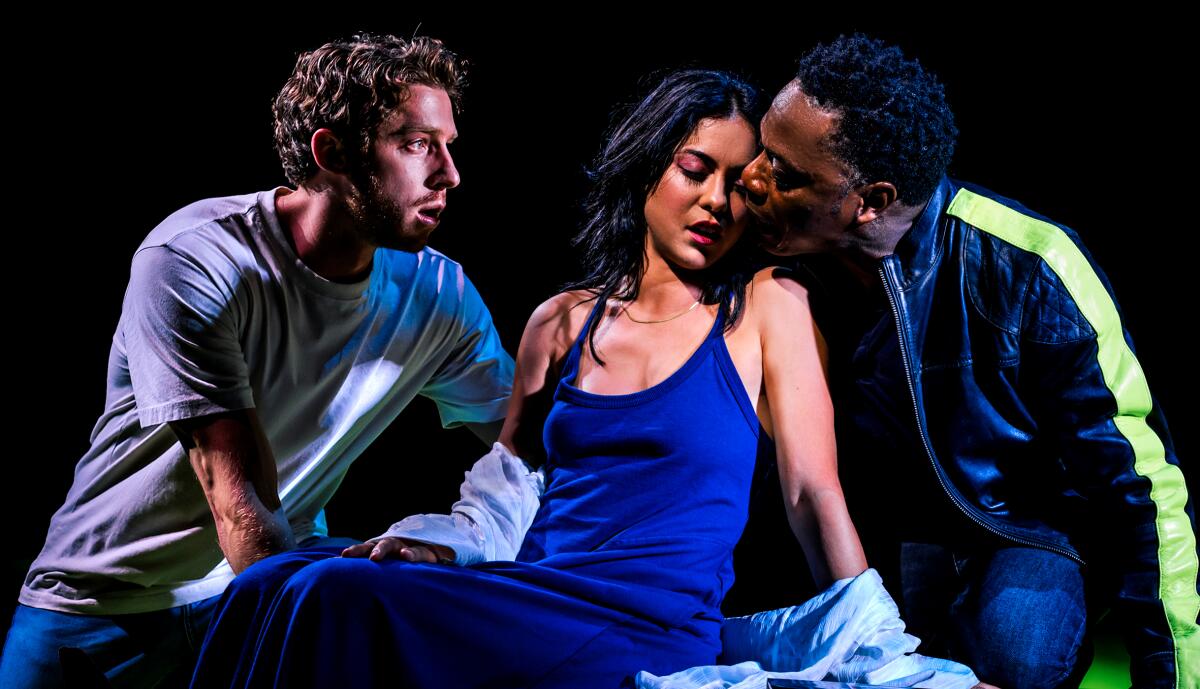Review: ‘Cyrano’ update at Pasadena Playhouse is all about the words

- Share via
Since its Paris premiere in 1897, Edmond Rostand‘s “Cyrano de Bergerac” has maintained a firm grip on the public’s imagination. The tale has in fact morphed into a modern myth, forever cropping up on stages and screens, sometimes in traditional form, sometimes in contemporary guise and sometimes as fodder for sitcoms, as in “The Brady Bunch” episode “Cyrano de Brady.”
What is the cause of this endless fixation on what in some respects is a musty, overlong and overexposed classic?
The answer, of course, is Cyrano himself. A French military man of noble breeding, he is as formidable a fencer as he is a wordsmith — and he combines these skills with Olympian flair when lashing out at the mendacity and mediocrity that society enshrines.
Now, at Pasadena Playhouse, is a true 21st century “Cyrano de Bergerac,” freshly updated in Martin Crimp’s free-hand adaptation. Mike Donahue’s colorful, gender-fluid, fourth wall-crashing production gives the language the lift of hip-hop. The characters rap their lines when they’re in full flow, their muse inspiring them with just the right rhyme at just the right moment to slay the competition. Rostand has rarely sounded so with it in English. Cyrano has finally become our contemporary.
Blessed in courage, intellect, imagination and style, Cyrano is cursed by a physical deformity. His nose is so gargantuan that he feels it disqualifies him from love. Secretly smitten with his distant cousin Roxane, he finds himself in a situation of tantalizing torture when called upon to help Christian, a new recruit in his charge, find the words to express his reciprocated passion for this same woman, whose standards of poetic excellence are as demanding as her cousin’s.
Cyrano’s verbal coaching and epistolary interventions provide a means for him to express all that is locked away in his heart. He sees the effect of his words on Roxane and takes pride in his finesse as a would-be lover whose capacity to woo easily surpasses the handsome yet cliche-ridden Christian. But his success only intensifies his loneliness. “Cyrano de Bergerac” speaks to the unconscious dilemma of those whose insecurities about outward appearance prevent their inner beauty from being fully released into the world.
Rostand distilled this vulnerability in a single facial feature, but Cyrano’s monstrous nose is a metaphor for the ugliness, real or imagined, that holds people back from revealing the love they are too afraid to declare. In Jamie Lloyd’s celebrated British production of Crimp’s adaptation that came to the Brooklyn Academy of Music in 2022, no prosthetic schnoz was employed.
What was perhaps even more remarkable about that production was the casting of Cyrano. James McAvoy, a stage and screen actor not lacking in sex appeal, played the title role with nary a blemish on his masculine beauty, proving through the anguish of his performance that vulnerability isn’t skin deep.
At Pasadena Playhouse, Chukwudi Iwuji portrays Cyrano with a more obvious sense of injury. His societal wound, while not attributable to any physical imperfection, is more apparent — the lived truth of marginalization. Best known for having played the lead villain in James Gunn’s “Guardians of the Galaxy Vol. 3,” Iwuji is an accomplished Shakespearean, and he wields Crimp’s language with a prowess that is at once dazzling and fierce.
Through Iwuji’s own exalted eloquence, Cyrano’s artistic relationship to language becomes a matter of life or death. The character’s refusal to censor himself infuriates the authorities, who want to suppress free speech, knowing that freedom of expression can only lead to freedom of thought, a potent danger for autocrats.
The play, set in a 17th century much like today, begins at a theater, where an audience has gathered to see the touted fop Montfleury (Jonathan Slavin) preen his way through speeches of “Hamlet.” Cyrano cannot tolerate the actor’s butchering of the text and drives him off the stage with his sword. He thus makes an instant enemy of De Guiche (Michael Nathanson), nephew of the all-powerful Cardinal Richelieu and a self-appointed culture czar.
Cyrano and De Guiche were never fated to be friends. The sleazy, scheming De Guiche has been using his power and manipulative wiles to trap Roxane in a situation where she’ll have no choice but to receive him as her lover. The plot is elaborate, in the French way, setting up situations that would be farcical were they not laden with mortal danger.

The theater is not just an important setting for “Cyrano” but also a mode of being. Donahue stages the play’s opening so that characters emerge from different parts of the audience. The actors don’t so much address theatergoers directly as wink at them in ironic asides. The mood is playful, and a game ensemble of 15 is wired for anachronistic mischief.
The scenic design by Afsoon Pajoufar and the lighting by Josh Epstein and Edward Hansen prepare the way for metatheatrical high jinks. The stage floor is painted a youthful lime green. Studio lights, standing like industrial sunflowers, dominate the scenery. There’s never any doubt that the action is happening inside a theater.
Iwuji anchors the production with his classical stature and fluency. His Cyrano is the play’s hero, even if the character’s psychological limitations are as much a factor in the story as the machinations of De Guiche, whose malignity is sent up in Nathanson’s flamboyantly comic turn.
Far from helpless and demure, Rosa Salazar’s Roxane has more in common with her cousin than with any other character in the play. She too is proud, controlling and quick to anger. She’s fighting patriarchal powers greater than herself, but she’s not to be underestimated, even if the production doesn’t quite clarify why everyone is in love with this stunning if rather irascible and self-involved young woman. That said, the seduction scene, in which Cyrano, standing in for Christian, makes love to Roxanne in words, has never been steamier.
The tenderest connection may just be between Cyrano and Will Hochman’s Christian, whose callowness isn’t quite what it seems. There’s more to this inarticulate cadet than his handsome exterior, though it will take some time for even the discerning Cyrano to recognize his subordinate’s distinction and to acknowledge his way with words. It’s only when Christian near the end of the play derides Cyrano’s “acres of highbrow wet dream prose” that Cyrano’s ears prick up in admiration.
Hochman, who was in the excellent 2019 Broadway production of “The Sound Inside,” delivers a performance of great maturity and poise. The intimate surprise that occurs late in the play between Cyrano and Christian might seem random but it resonates when you consider their connection from a metaphoric point of view. Do these characters — one irresistible as a face and body, the other irresistible as a mind — make an ideal lover only when combined?
Strong supporting help comes from Larry Powell, whose gender-fluid Lignière, one of Cyrano’s poet buddies, makes the most of Carolyn Mazuca’s flamboyant costume designs. Veteran Kimberly Scott imbues Madame Ragueneau, the café-bar-bookshop-patisserie owner who is also a writing instructor of unerring instinct, with both levity and gravity.
Donahue, who directed the terrific revival of “Little Shop of Horrors” at Pasadena Playhouse and the extraordinary West Coast premiere of “The Inheritance” at the Geffen Playhouse, does such an impressive job with this overwhelming play that I hesitate to mention that some of the modern touches come off as superficial, which is to say untied to a larger interpretive vision. And I once again couldn’t quite figure out how Crimp could be so comfortable in making Rostand’s original his own yet so resistant to cutting the play to a more manageable length for contemporary audiences.
“Cyrano de Bergerac” is built like a libretto. No wonder composers have been drawn to Rostand’s play. Music might be the missing ingredient. (“Cyrano,” Joe Wright’s uneven 2021 film starring Peter Dinklage that was based on the 2018 stage musical, was certainly onto something in its impulse to turn drama into song.) But this production offers its own harmonious compensation: modern day verbal panache and a company of vibrantly unconventional actors, led by a galvanizing Iwuji in a performance of unmistakable beauty.
‘Cyrano de Bergerac’
Where: Pasadena Playhouse, 39 S. El Molino Ave., Pasadena
When: 8 p.m. Wednesdays and Fridays, 7 p.m. Thursdays, 2 and 8 p.m. Saturdays, 2 p.m. Sundays. (Check for exceptions.) Ends Sept. 29
Price: Start at $40
Info: (626) 356-7529 or PasadenaPlayhouse.org
Running time: 2 hours, 45 minutes (including one intermission)
More to Read
The biggest entertainment stories
Get our big stories about Hollywood, film, television, music, arts, culture and more right in your inbox as soon as they publish.
You may occasionally receive promotional content from the Los Angeles Times.











